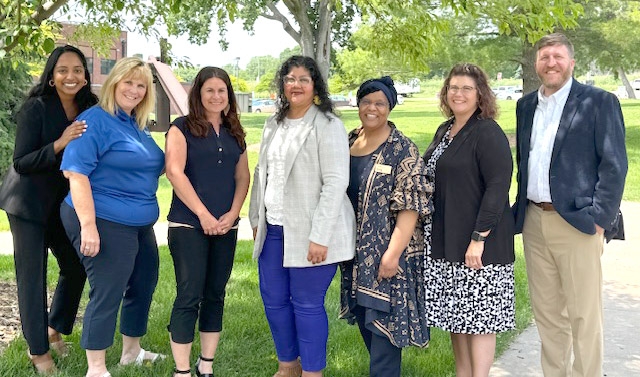By Zoë Corwin
When tackling a tenacious institutional challenge, how do we navigate institutional silos that pose profound challenges to collaboration? How frequently do we carve out time to connect with colleagues from different roles and units across campus, learn together, push our thinking, strategize for change, and then enact the changes we envision? Professional Learning Communities, or PLCs, offer what we’ve discovered to be a viable solution to this challenge.
During the first phase of the Promoting At-promise Student Success (PASS) project (2015- 2020), our research team worked closely with the University of Nebraska’s Thompson Scholars Learning Communities (TSLC) program to document their robust approach to validating and supporting their students. TSLC educators proactively sought to support students at three University of Nebraska campuses, including the University of Nebraska at Kearney (pictured here), and did so in ways that meaningfully connected students to resources across campus.
In the second phase of the project (2020-present), we have been working with the campuses to share this approach beyond the TSLC programs and extend a culture of ecological validation at the institutional level. To do so, we launched a series of cross-functional professional learning communities (PLCs) where academic affairs, student affairs, faculty and central administration practitioners convened to bolster the student success work they were already doing — and in some cases, forge new territory.
Professional Learning Communities have been well-received in K-12 settings to tackle systemic challenges facing schools — yet are seldom utilized in postsecondary settings. Instead, colleges and universities tend to have standing committees or episodic gatherings where they convene to address a particular problem (see Kezar et al.). These groups might include a diverse group of cross-campus stakeholders but seldom carve out ample time to engage in learning and community building. Faculty learning communities, on the other hand, dedicate time to learn together. Yet they seldom involve cross-functional groups of campus stakeholders. Professional learning communities, however, hold potential to do both — bring faculty, staff and administrators together to think differently and to strategize ways to enact culture change.
Given the deep commitment to at-promise students we had witnessed in our University of Nebraska partners as well as what we knew about PLCs in K-12 settings, we anticipated that PLCs would be a viable mechanism to further their student success work. Over the next three years, as our research team co-facilitated the PLCs, we deepened our understanding of why and how postsecondary PLCs are poised to be effective mechanisms for change. We have been tracking learning processes, key insights for colleges and universities interested in running PLCs, and innovations in professional development, communication strategies and data mapping/sharing. We are still in the process of analyzing the impact of the PLCs. In the interim, I invited three of our PLC participants to share how the experience affected their perspective on at-promise student support.
Courtney Santos, Director of the University of Nebraska-Lincoln’s Undergraduate Research & Fellowships, spoke about the effect the PLC had on her own individual professional trajectory as well as her ability to connect with others on campus. “The PLC helped me to embrace new responsibilities, challenges, and the experience of change with courage and clarity. By discussing how my work contributes to a campus-wide ecology of validation, I was able to connect my efforts to learn, grow, adapt, and reflect on the impact that I wanted to have on student success and belongingness. Within the cross-functional group, I gained opportunities to appreciate others’ expertise and perspectives, share institutional knowledge and collaboration tips, and practice validation strategies with supportive peers.”
Melissa Berke, Associate Dean of the University of Nebraska Omaha’s College of Communication, Fine Arts, and Media highlighted the impact of learning on the way her college functions as well as the value of networking through shared commitment to student success, “My participation in the PLC has been invaluable. The study of ecological validation and its value to the student experience has changed the way my college looks at different processes such as academic probation, retention and onboarding to make them more student-friendly. Additionally, meeting regularly with others across campus has built a network of people committed to creating a culture that puts students at the center of all we do.”
Renee Besse, Director of Financial Aid at the University of Nebraska at Kearney, shared how the PLC on her campus inspired her to re-focus her approach to supporting students, “My involvement with the PLC has allowed me the opportunity to learn and live the student-centered culture. Although I always thought of myself as student-centered, the new and perhaps cleaner lens I view my work through now has me re-focusing on strategies and processes to support the culture of ecological validation. Colleagues that joined me on the PLC have enlightened and challenged me to do better for our students. As we continue to share our insights regarding ecological validation with other colleagues on campus, I look forward to being part of an impactful cultural change effort at UNK."
The learning that transpired in the PASS PLCs focused on ecological validation as a key concept to promote at-promise student success — a point highlighted above. But perhaps more profound is the acknowledgement that regularly engaging with cross-functional colleagues who share similar goals is where the real potential of PLCs lies. At a time when postsecondary institutions are struggling with the “great resignation,” it’s worth considering the potential of PLCs not just on improving student experiences on campus, but those of faculty, staff and administrators as well.








